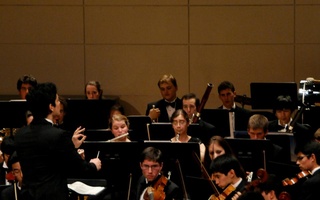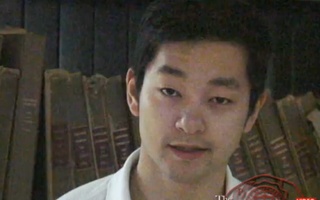
The Bach Society Orchestra played selections from Prokofiev, Poulenc, Mozart, and “Nightclub Scenes”, conducted by Yuga J. Cohler ’11.
The Bach Society Orchestra (BachSoc) gave its third performance of the season this past Saturday in Paine Hall. Under the baton of Yuga J. Cohler ’11, BachSoc presented Prokofiev, Poulenc, Mozart, and the premiere of “Nightclub Scenes,” a student piece created for the orchestra’s annual composition competition. Because of its modest size, the performance was intimate and inviting, maintaining a high standard throughout.
The evening began with Sergei Prokofiev’s Symphony No. 1 in D major. The piece established the neo-classical flavor of the night’s first three works with sweeping, sometimes dissonant harmonies punctuated by pizzicato and sharp percussion. Cohler presented the third and fourth movements with an especially tasteful choice of tempi that allowed his musicians to end the piece with a rapid, energetic flourish.
This energy continued into Francis Poulenc’s Concerto for Two Pianos and Orchestra in D minor, which featured 2009-10 Concerto Competition Winners Stephanie J. Brinton Parker ’10 and Lindsey R. Brinton ’12, who are sisters. The challenge of piano four hands is daunting for even accomplished pianists, but the sisters complemented each other’s performances both in terms of technique and stylistic expression. The interplay between them was so precise that it was difficult to tell which pianist was playing which phrase, creating a truly seamless piano performance. Though Poulenc rose to fame in France as an avant-garde composer in the early 1900s, he was an artist before his time. A century later in Paine Hall, his piano concerto still sounds dashingly innovative.
BachSoc then presented the highly anticipated premiere of 2009-10 Composition Competition Winner “Nightclub Scenes for Solo Piano and Orchestra,” by Zachary T. Sheets ’13. Though “Nightclub Scenes” fit nicely with the modern sound of Prokofiev and Poulenc, there was a distinctively jazzy, almost sultry feel to Sheets’s composition. Written as “a classically inspired piece with a sense of harmony rooted in jazz,” Sheets delegated the roles of the jazz band’s walking bass, tenor saxophone, and trumpet to the cello, viola, and violin, respectively. Tying the piece together was pianist Jennifer Chen ’11, whose performance evoked the mysterious sophistication of a nightclub. Sheets enraptured his musicians and audience alike, with the orchestra coming alive as they played his work.
Concluding the evening with Mozart’s Symphony No. 35 in D major, or the Haffner Symphony, BachSoc revealed the careful attention it paid to its selection of the evening’s works. The Haffner Symphony was a surprising segue from “Nightclub Scenes,” as it celebrated the classical period that influenced Prokofiev and Poulenc’s modern works. With Cohler conducting, BachSoc ended the Haffner Symphony with the exuberance that this work demands, as a final display of the refined sound that the orchestra conveyed throughout the night.
Read more in Arts
Broken BellsRecommended Articles
-
 BachSoc Wavers in Season Opener
BachSoc Wavers in Season Opener -
BSO’s ‘Project Beethoven’ Hits the RunwayAll roads lead to Beethoven,” said Owen C. Young, a cellist in the Boston Symphony Orchestra (BSO) on February 3.
-
BachSoc’s Tribute to the RomanticsLast Friday, the Bach Society Orchestra (BachSoc) filled Sanders Theatre with the 19th-century sounds of its third seasonal concert, exchanging ...
-
 Ryu Goto '11
Ryu Goto '11 -
Chung Shines in Bold BSO PerformanceThe BSO coupled restraint with its trademark power to spellbinding effect.
-
BSO Daring, Dexterous, and DynamicIf Felix Mendelssohn was the genre-defining master of Romanticism, Dmitri Shostakovich was the master of disguising acerbic expressions against the ...













